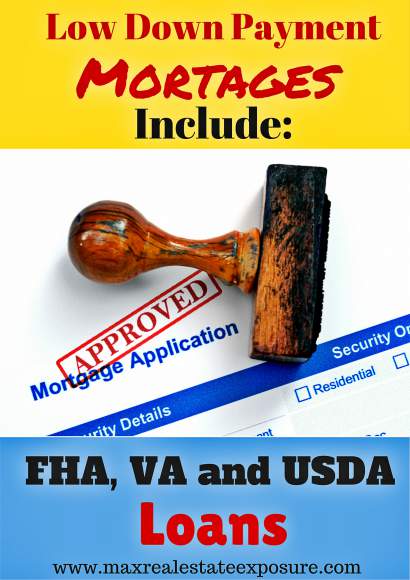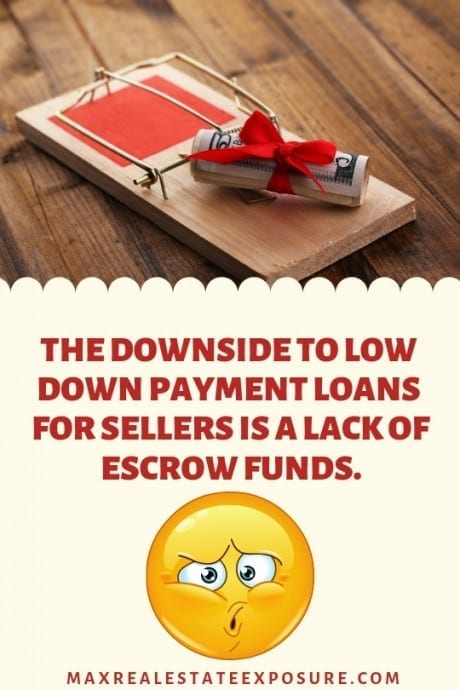 Low Down Payment Mortgages Work For Many Home Buyers
Low Down Payment Mortgages Work For Many Home Buyers
Are you considering buying a house with a low down payment?
For most potential home buyers getting a low down payment mortgage is no issue.
Even with lending standards tightening up following the financial crisis, several no-down payments and low-down-payment loan options exist for qualified buyers.
Unfortunately, some sellers and their Realtors are making the mistake of pushing away these buyers by demanding a higher down payment than is necessary.
There seems to be some confusion between these sellers and their agents regarding what qualifies a buyer to get a loan and whether that no-down-payment buyer will be a good person to sell to.
In many cases, a buyer with a twenty percent or more down payment is no more likely to get a loan than a no or low down payment borrower.
Don’t make the mistake of brushing aside a qualified buyer by demanding too high a down payment when selling your home! Unless you have multiple offers and can pick and choose the best deal, a low-down payment borrower can be just fine.
A small down payment doesn’t mean the buyer is not qualified! Low down payment mortgages are no less common than buyers who put more down. The average down payment for a first-time home buyer is around 6%.
Money Is Money – Whether From A Mortgage Lender Or A Buyer
Some sellers – perhaps at the encouragement of their listing agent – ask buyers to deliver a larger deposit or down payment than they need to.
Sellers and their agents are free to ask for what they like for a home, and it makes sense to verify that a potential buyer can pay for the home.
But these particular buyers are receiving pre-approval for a loan from a major lender, which means that the money is good – it is just coming from the lender instead of the buyer.
Getting a low-down or no-down payment loan today requires all the same steps as getting the average loan and, in many cases, even more documentation. The individual applying must meet strict criteria to qualify.
They must provide tax returns, financial statements, and proof of income. The lender reviews all the buyer’s information to verify that the applicant can pay back the loan.
The credit score needed to buy a house will also be checked. While a good credit score is helpful, many buyers can get a loan without one. Their mortgage terms won’t be as desirable.
Understand The Difference Between Pre-approval and Prequalification
Only then do they offer a mortgage pre-approval? Just be sure you receive pre-approval, not a prequalification letter. There is a vast difference between these two types of mortgage letters.
Unfortunately, many real estate agents do not know the difference and submit offers with less desirable prequalification.
When I represent a client selling their home and receive a pre-qual letter, the agent is asked to supply a pre-approval instead. We will accept an offer only after this letter is received.
It is also worth remembering that many of these low to no down payment specialized loans come from some of the largest organizations in the country and are backed by the federal government.
Unless the country becomes completely insolvent, the chance of the backer of the loan not being able to pay in full is highly unlikely.
This is why banks nationwide are more than happy to work with these specialized loans.
To turn away a buyer that uses one of these loans does not make much sense when you understand that the lender is legitimate and that it has done all the due diligence to ascertain the risk of the loan.
Therminimalittle risk to the seller. When the transaction has closed, and the lender sends the full payment for the home to the seller, it works exactly as it would with a traditional loan as far as the seller is concerned.
Sometimes a borrower chooses to go with one of these programs because they provide one of the best ways to get a lower mortgage interest rate. This can certainly be attractive to a buyer who plans to stay in the home for an extended period.
Understanding Mortgages That Are Low Or No Down Payment
 There are several options for obtaining a low or no-down payment loan, including FHA, VA, and USDA loans.
There are several options for obtaining a low or no-down payment loan, including FHA, VA, and USDA loans.
You must meet specific criteria to qualify for any of these first-time home buyer loans.
FHA Loans
FHA loans are low-down payment loans that allow the buyer to purchase a home with 3.5% or more as a down payment.
An FHA loan has slightly different credit requirements than standard home loans, but the criteria are not easy to meet if you are not worthy of a loan.
Applicants must meet a specific debt-to-income ratio and still be able to repay the loan. FHA mortgages are common and comprise a large percentage of the financing borrowers choose when purchasing a home.
If you are buying a fixer-upper, you can use an FHA 203k loan which roles the cost of the renovations needed into the purchase price so you have one loan.
You can learn even more about FHA loans from the HUD website.
FHA loans are one of the best options when you want to get a low down payment mortgage.
VA Loans
The federal government backs VA loans. Those that qualify do not have to come up with a down payment if they do not want to. The loans are so generous because of the qualifications for getting them include military service.
The type of loan an applicant can get will depend on several factors, such as how many years were served and the type of discharge the service member received.
You can see all the benefits of a VA loan and the qualifications behind getting one. Often, those using VA loan financing will be doing so for the ability to finance 100 percent of the purchase.
USDA Loans
USDA loans are designed to help low to middle-income families buy properties in rural areas. These loans come through a partnership with the USDA. Area lenders give total financing, requiring no down or low down payment.
You learn about this type of loan program by reading the common facts about USDA loans. This program is fantastic for those who have not saved anything for a down payment but are otherwise qualified and ready to buy a home.
Buyers Should Be Aware Of What These Loans Do Not Cover
If you are a buyer fortunate enough to qualify for one of these loans, you should know that even 100% financing does not pay for all the home costs.
There are closing costs to consider and the cost of a home inspection and appraisal.
You can request that the seller give you a concession, but not all sellers will be eager to do this. Remember that the seller will be concerned about their bottom line when preparing your offer and asking for a closing cost credit.
Any seller concession you request is being deducted from their net proceeds. So while you think your offer amount may be fair if the closing cost credit is excessive, the seller will think otherwise.
In some situations, their agents do not explain the benefits of closing cost credits to buyers and sellers. In this circumstance, you may have to come up with the closing costs independently without seller assistance.
As a buyer, you can also expect the seller to request a deposit for earnest money. The deposit can range from 2% to 5%, which can be considerable if you are unprepared.
You may be able to get your Realtor to help you determine how to structure the transaction where your deposit comes back to you as a credit at the closing. But again, you will need the seller to agree to this. Not all sellers will.
Why Some Choose Low-Down Payment Mortgages
 Sometimes a buyer will put down a small amount of money when purchasing a home, which has nothing to do with the common reason of “that’s all they have.”
Sometimes a buyer will put down a small amount of money when purchasing a home, which has nothing to do with the common reason of “that’s all they have.”
There are many occasions where a very well-qualified buyer will still own their existing property and will be buying another home.
When buying and selling at the same time, borrowers will often try to purchase with a low down payment before selling their current home.
They do this because much of their equity is tied up in their current home. In this circumstance, they will typically refinance once their home is sold, often putting twenty percent down to avoid the cost of private mortgage insurance.
If a buyer can afford to own two homes simultaneously, they are more than qualified!
You Can Invest Elsewhere Instead of a Mortgage
Additionally, a particular market segment believes that having a large mortgage makes far more sense when money is cheap.
Instead of putting extra money down, they use these same funds in investments that can make them money instead of being tied up in a mortgage.
Many of these people are overqualified to buy your home. They choose to take their money and invest it in the stock market or other financial vehicles.
Let’s also not forget about the mortgage interest tax deduction. Those who are financially savvy also recognize there can be tax benefits to having a larger mortgage. This tax deduction can be used to bring their yearly tax bill down.
These are three examples of why you can’t assume that a small down payment means the buyer is not well-qualified. Your real estate agent should always attempt to verify why a certain amount of money is put down on the sale.
Only then will you have a good picture of the borrower and decide how to handle things accordingly.
The Most Significant Downside of a Low Down Payment Mortgage
There is one substantial downside for a seller accepting a low down payment mortgage. Buying a house with a low down payment can be troublesome in an extreme seller’s market where bidding wars exist.
Often the price is driven up far over the asking price. In a circumstance such as this, if the home does not appraise, the seller may be out of luck if the buyer does not have additional down payment funds.
The lender will want to ensure ample equity when providing financing. When there is an appraisal gap, buyers will be asked to increase their down payment to compensate for the shortfall.
If they don’t have it, the sale will fail unless the seller drops their price to the appraisal amount. Not many sellers want to do that!
When there are bidding wars with home prices driven up, the safe bet is choosing an offer with a significant down payment.
In a buyer’s market where bidding conditions don’t exist, it is not a problem most people worry about.
The Earnest Money Deposit Becomes Important Too
 For a seller, the earnest money deposit should be a more significant concern when dealing with a low or no-down-payment borrower and not their ability to get the loan.
For a seller, the earnest money deposit should be a more significant concern when dealing with a low or no-down-payment borrower and not their ability to get the loan.
The earnest money keeps a buyer honest during a real estate transaction.
This is the money a seller will keep if a buyer does not perform under the terms of the contract.
Let’s say; for example, you have your home on the market for $400,000. In many places, a typical earnest money deposit would be 5% of the purchase price or $20,000. This would be a pretty hefty sum for a buyer to lose.
You will often see a token dollar amount put down with a no-down payment borrower. Many times it is just a couple thousand dollars.
Doing some quick math, you can see a vast difference between putting five percent down and only a few thousand dollars.
The point of getting earnest money from a buyer is to prevent them from quickly walking away from the transaction. When dealing with a low down payment borrower, the likelihood of this happening increases.
This is where you and your real estate agent must determine whether accepting the offer is worth the risk.
In most instances, you are not talking about having your home off the market long. Recently I was selling a home in Mendon, Massachusetts, where the buyer was getting a USDA loan. The down payment was only two thousand dollars.
The seller was rightfully concerned about accepting the offer with such a low deposit. Ultimately, we ran with it because the buyer wanted a quick closing.
Final Thoughts on a Low Down Payment Mortgage
Ultimately, when you put your house on the market, you are there to sell. You want someone to pay you for your home so you can move on from it.
Whether the money comes from gold bars out of someone’s cellar or a check from a specialized loan, you can still get the same outcome from the sale.
Sellers and listing agents should remember this when considering how much they will demand from buyers.
If there are no multiple offers on the table, never discount the fact that a buyer with a low down payment could be just as attractive as a buyer with more to put down. Look over all of the terms in the offer.
Never assume that a buyer choosing to put less money down is your worst choice. Make sure you have your real estate agent do all the necessary due diligence to select the right offer.
Additional Helpful Financing Articles
- When and why you should get pre-approved for a mortgage via Rochester Real Estate Blog.
- Why down payments are getting smaller – see why down payment amounts from home buyers are shrinking via The Wall Street Journal.
- Best home selling advice from multiple real estate authors via Sell My Home in Metrowest, Massachusetts.
Use these additional financing articles to educate yourself on home buying and selling. A well-educated client will likely find themselves avoiding any of the hiccups that can occur in a real estate transaction.
About the author: Bill Gassett, a nationally recognized leader in his field, provided the above Real Estate information on buying a house with a low down payment. Bill can be reached via email at billgassett@remaxexec.com or by phone at 508-625-0191. Bill has helped people move in and out of Metrowest towns for the last 37+ Years.
Are you thinking of selling your home? I am passionate about Real Estate and love sharing my marketing expertise!
I service Real Estate sales in the following Metrowest MA towns: Ashland, Bellingham, Douglas, Framingham, Franklin, Grafton, Holliston, Hopkinton, Hopedale, Medway, Mendon, Milford, Millbury, Millville, Natick, Northborough, Northbridge, Shrewsbury, Southborough, Sutton, Wayland, Westborough, Whitinsville, Worcester, Upton, and Uxbridge MA.

